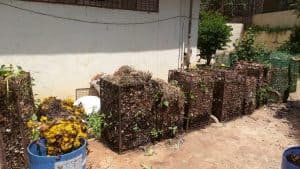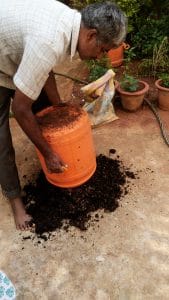The name board of the Chitrapur Mutt in Malleswaram is hidden behind a thicket of trees inside the compound. The gate is lined with colour coded waste bins that indicate the disposal of different kinds of waste. The Saraswat-Konkan community that takes care of this mutt, started practicing zero-waste processes in 2014.

Biodegradable waste is put in these containers. Flowers are composted separately. Pic: Akshata Chonkar
Rekha Mavinakurve, a frequent visitor of the mutt, is also an active volunteer in Malleshwaram working on solid waste management issues. She is a member of Malleshwaram Swabhimana Initiative, a community-based organisation (CBO) group that works in Malleshwaram. She spearheaded the movement to shift towards a completely independent method of managing waste in Chitrapur mutt.
She explained that while the mutt had been segregating their waste for over nine years, there was a sort of dissatisfaction about the way the waste was managed once it was given to the authorities. She said, “we separated our paper and plastic from the biodegradable waste, but it was always mixed up by the trucks that came to pick up the waste. We started giving the plastic to the ITC company for recycling, but the food waste was still a big issue.”

Pic: Akshata Chonkar
Along with Poornima, the head of the mutt volunteer group, Rekha set up a composting system at the garden. Thus the garden of the mutt also became the composting area where the waste turned into fertiliser. Says Poornima, “we encourage all the devotees at the mutt to practice segregation all around them, since it becomes an unconscious practice rather than a forced effort if it is done in all surroundings, apart from just the mutt.” She also adds, “we have kept this practice up under the guidance of our swamiji, who has been very supportive of this cause.”
Soon, other volunteers learned the process and started practicing it. For almost three years now, the flowers used as offerings are decomposed separately, while raw vegetable and fruit peels are put in different containers. The coconuts that are offered during poojas leave behind a lot of husk, which is dried and used instead of firewood by the mutt itself.
“Under the guidance of our guruji, we have taken up this process and it gives us immense joy to see that nothing is lost and everything that we leave behind is used in the cycle to produce more,” said Rekha.
During large-scale functions, leftover cooked food items are separated and dumped in a waste pit in the backyard of the garden. The process of composting all of this waste takes about two to three months. The compost is then used as manure for the several plants and trees growing in the mutt premises.
Volunteers have also planted various flowers, fruits and vegetable plants, that are used as offerings and prasadam in the mutt. They have recently begun growing hibiscus, rose, radish, pomegranate and tulsi plants, all of which are used in the mutt.
There is no use of plastic inside the mutt premises. The devotees are asked to take back any plastic or paper that they bring inside. The mutt has stopped using plastic cups and plates to distribute their prasadam.
“We have frequent poojas and upanayanams that take place in the mutt, so we urge the devotees not to use disposable utensils for their programmes. We have bought 1000 washable cups, plates and spoons each, with the help of some donations and the mutt savings, and we provide these to the people who organise functions here,” explained Rekha.
This also had a compounding effect: many of the volunteers at the mutt have now started practicing segregation and composting in their own homes.
Akshata Chonkar was an intern at the Co Media Lab, an initiative of Radio Active 90.4 MHz and Citizen Matters.